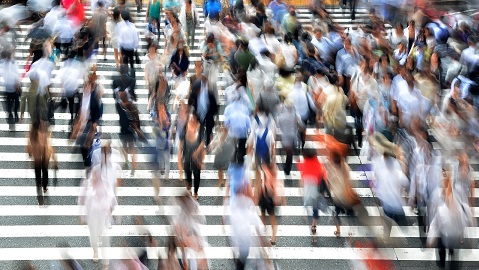How humans around the world spend their time on an average day
Everyone has 24 hours per day. Across the global population of 8 billion people this adds up to approximately 190 billion human hours. How those hours are spent determines the impacts we have on our surroundings as well as how we experience life.

To find out how people around the world use their time, a research team involving ICTA-UAB has gathered and analysed information about both economic and non-economic activities in order to estimate, for the first time, what a day in the life of the world looks like.
“At present, we are struggling to come to terms with global challenges, and that calls for fresh perspectives on how the world works,” says Eric Galbraith, a researcher at ICTA-UAB and McGill University and senior author of the study published today in PNAS. “If we are to sustainably navigate climate change and biodiversity loss, adapt to rapid technological change, and achieve global development goals it is crucial to understand the big picture of how the global human system functions, so that we can see where there is potential for change.”
A holistic, birds-eye view of our collective efforts
Researchers wanted to know what humanity's time allocation looks like, averaged over all people and across all countries. “In other words, if the world were a single average person, what would their day look like?”, adds William Fajzel, a PhD student in Earth System Science at McGill University and first author of the study. To find out, the research team looked at time use and labour data gathered for the period from 2000-2019 (to avoid any impacts from the COVID pandemic) from over 140 countries (representing 87% of the world’s population).
The researchers categorised all the things people do in a waking day, including both work and non-work activities, according to what the purpose of the activity was. They used 24 categories that fall into three broad groups:
- Intended to alter the external world (including the provision or modification of food, energy, buildings, the maintenance of surroundings, etc.)
- Focused directly on human minds or bodies (including caring for the cleanliness, appearance, mood and health of self and others, as well as education, religion, hobbies, socialising, sports, media, resting, etc.)
- Organising activities within society (such as transport, trade, finance, law and governance, etc.)
Most of each day is focussed on ourselves and others
They then manually classified nearly 4,000 unique activities. And made some surprising discoveries. The researchers found that the single largest chunk of time goes towards activities that are human-centered – a little more than 9 hours. Sleep or being in bed accounts for an additional 9 hours (the global estimate includes youth who tend to sleep longer hours). Of the remaining 6 hours, growing and collecting our food, preparing it, commuting and moving around, and allocational tasks (such as trade, finance, sales, law, governance, policing) each occupy around 1 hour. Waste management accounted for just 1 min of the global day, in stark contrast to the 45 minutes spent tidying and maintaining our dwellings. All infrastructure and building construction is accomplished in about 15 minutes.
Surprisingly, time spent on activities like meals, daily travel, hygiene and grooming, and food preparation do not change in a systematic way with the material wealth of a population. In contrast, the time spent growing and collecting food varied strongly with wealth, from over 1 hour in low-income countries to less than 5 minutes in high-income countries.
The global human day, including both work and non-work activities
A mere tenth of the day is dedicated to economic activities
Since the study includes both economic and non-economic activities, a portion of the total time in each of the categories described above represents people engaged in economic activities – e.g., doctors and nurses, chefs and agricultural labourers, etc.
The team estimated that the entire global economy occupies around 2.6 hours of the average human day. This economic activity is dominated by agriculture and livestock production, followed by allocational activities like trade, finance and law, and manufacturing. While the total of 2.6 hours may seem small, the labour force makes up only about half of the world’s population, for whom this equates to a 40-hour work week.
The global economic day shows the average time spent on employment, averaged across the global population.
The results of the study provide a unique perspective on how economic activities fit into the overall fabric of human life at a global scale. They also suggest that there is plenty of scope to shift time allocation around certain activities, such as extracting materials, provisioning energy, and dealing with wastes, all accomplished within about seven minutes.
Original article
Fajzel. W., Galbraith, E.D., al. (2023) The global human day. PNAS https://doi.org/10.1073/pnas.2219564120